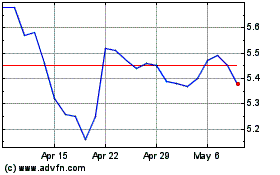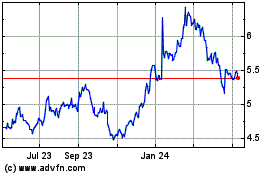By Newley Purnell
NEW DELHI -- President-elect Donald Trump doesn't take office in
Washington until Friday, but he is already forcing firms in India's
mammoth $108 billion technology-outsourcing industry to rethink
their hiring practices in the U.S., their largest market.
While Mr. Trump has chastised U.S. firms for offshoring American
jobs, Indian outsourcing firms could be set to see renewed heat for
doing the opposite -- placing foreign workers in the U.S., mainly
through a skilled-worker visa, known as the H-1B. Faced with the
prospect of possible new curbs on those visas from a president who
has pledged to ensure that Americans get their first pick of
available jobs, outsourcers are ramping up hiring both on American
college campuses and at home in India.
"Depending on the nature of the policy, it can have some impact
on the way companies like mine have worked in the past, so we will
have to adjust to that," said Vishal Sikka, chief executive of
Infosys Ltd., one of India's top outsourcing and software
companies, in an interview in Davos, Switzerland.
Nothing that there is a "severe shortage" of people with the
right technical skills in the U.S., Mr. Sikka said Infosys would
still have to "train and hire more locally and work together with
clients in figuring out how to balance that with the global talent
that is outside, using more technology and so forth and use the
visa as necessary and as permitted."
Early this month, prominent Republican lawmaker Rep. Darrell
Issa reintroduced a bill to tighten H-1B rules. But it is still
unclear what action Mr. Trump or his administration might take, if
any, to restrict the visas.
Mr. Trump issued a statement during the campaign vowing to "end
forever the use of the H-1B as a cheap labor program," though at
other times he said he supported highly-skilled immigration. In
addition, his wife, Melania Trump, says she used an H-1B visa to
work in the U.S. as a fashion model, meaning Mr. Trump might be
personally familiar with the program's practical applications.
The demand for H-1B visas, intended to fill jobs for which there
aren't qualified Americans, is high both from U.S. technology firms
like Microsoft Corp. and Intel Corp. and Indian outsourcing
companies such as Infosys, Tata Consultancy Services Ltd. and Wipro
Ltd. Last April, the number of applications surpassed the entire
fiscal year's supply of 85,000 visas within five days, making it
the fourth straight year in which demand surpassed supply in under
a week. Some two-thirds of the visas, allotted by lottery, go to
the tech sector.
U.S. critics of Indian outsourcers say the firms secure
high-skill visas for jobs U.S. workers could do for clients like
banks, retailers and others, but for whom they would have to pay
more. The Indian firms say they have difficulty finding enough U.S.
tech workers to hire.
"We hope we can work together" with the Trump administration,
said Shivendra Singh, who heads global trade development for
India's tech industry body Nasscom, which cut its growth forecast
for the outsourcing industry soon after Mr. Trump's election.
Mr. Singh acknowledged Indian firms grapple with the perception
that they rely excessively on skilled-worker visas. "People mention
visa abuse, low cost labor, the replacement of American workers,"
he said, but he noted that outsourcers work with most of the U.S.'s
largest corporations, contributing to the American economy.
A spokeswoman at TCS, India's largest outsourcer by sales,
didn't immediately respond to questions about the company's
preparations for potential changes to visa rules. A Wipro spokesman
declined to comment, citing the quiet period ahead of its quarterly
results due next week.
Following the U.S. election, Nasscom, which stands for the
National Association of Software and Services Companies, in
November cut its growth forecast for the sector to 8%-10% for the
fiscal year ending March 31. That is down from a previous estimate
of 10%-12% and far below the industry's 16.5% growth for the fiscal
year ended in 2012. The group cited "global, political and economic
and business scenarios" among the factors.
In India, the outsourcing industry employs nearly 3.7 million
people, representing a crucial path to the middle class in the
world's second-most-populous country. The U.S. accounts for about
60% of the Indian outsourcing industry's revenue, according to
Nasscom, and India's outsourcers send tens of thousands of workers
to the U.S. every year.
Hiring more workers in the U.S. could raise costs for Indian
tech firms, said Madhu Baba, an analyst who studies the tech sector
at Mumbai-based brokerage Prabhudas Lilladher, as they would likely
demand higher salaries. Indian staff are also more likely to move
to wherever they are needed in the U.S. and can simply be sent home
when projects end, while workers hired domestically might be less
mobile and may expect longer-term employment, he said.
Outsourcers might look to acquire smaller IT-services firms in
the U.S., which would boost their manpower there but require
financial outlays in the near-term, he said. The companies are also
looking at hiring additional workers in India to do more work for
companies in the U.S. remotely, Mr. Baba said.
The increased scrutiny on outsourcing firms' U.S. hiring
practices comes as they also face challenges due in part to the
rise of new technologies like cloud computing, which require less
labor.
To make matters worse, outsourcers' clients in the critical
financial industry have also been slashing IT budgets amid
macroeconomic uncertainty following the U.K. referendum to leave
the European Union and Mr. Trump's election.
Deborah Ball contributed to this article
Write to Newley Purnell at newley.purnell @wsj.com
(END) Dow Jones Newswires
January 19, 2017 09:35 ET (14:35 GMT)
Copyright (c) 2017 Dow Jones & Company, Inc.
Wipro (NYSE:WIT)
Historical Stock Chart
From Mar 2024 to Apr 2024

Wipro (NYSE:WIT)
Historical Stock Chart
From Apr 2023 to Apr 2024
